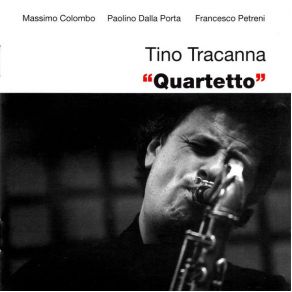Quartetto
Download links and information about Quartetto by Tino Tracanna. This album was released in 1996 and it belongs to Jazz genres. It contains 12 tracks with total duration of 56:56 minutes.

|
|
|---|---|
| Artist: | Tino Tracanna |
| Release date: | 1996 |
| Genre: | Jazz |
| Tracks: | 12 |
| Duration: | 56:56 |
| Buy it NOW at: | |
| Buy on iTunes $9.99 | |
Tracks
[Edit]| No. | Title | Length |
|---|---|---|
| 1. | Batraci | 2:00 |
| 2. | Rosso malpelo | 5:06 |
| 3. | May the 17th | 6:41 |
| 4. | Lepidotteri | 5:06 |
| 5. | Domus Novas | 3:33 |
| 6. | Simplicity | 7:10 |
| 7. | Avorio | 4:30 |
| 8. | Spirit | 2:29 |
| 9. | Nodi | 6:05 |
| 10. | Born In the Zoo | 4:50 |
| 11. | Monkeys | 4:45 |
| 12. | Casual Variations On J.C. | 4:41 |
Details
[Edit]Italian saxophonist Tino Tracanna leads all too few recording dates. This studio date recorded in 1996 features, for the first time, all of Tracanna's own compositions and a quartet with which he is intimately familiar: bassist extraordinaire Paolo Della Porta, Massimo Columbo, and drummer Francesco Perenti. What's most remarkable about the interplay that Tracanna inspires in his musicians is his deep lyrical sensibility that says as much about the Italian tradition in the music as it does about the melodist himself. The set opens with "Batraci," an open staccato meditation on Monk's harmonics. Tracanna plays through the melodic fragments, waiting that extra second for Columbo to tie the knot and for Della Porta to punch it home. On "Simplicity," he takes a figure from "Autumn Leaves" and weaves it through a series of knotty 16th notes and various key changes and plants it in an entirely different harmonic sphere — never losing a swinging beat in the process. Tracanna's tone is warm and rich throughout; he relies as much on conveying passion as he does on his considerable technical grace and vision. When he enters post-bop terrain on "Born in the Zoo," Tracanna leads the band on a chase through all 12 keys, blistering 32nd notes, and even angular scales to make a monkey dizzy! Then, on "Spirit," he turns in a ballad performance so languid and pure, so full of lilting ostinato, that the listener is tempted to weep. In all, this is a glorious date for Tracanna, who — after Mario Schiano — is the most wonderful of the Italian saxophonists.